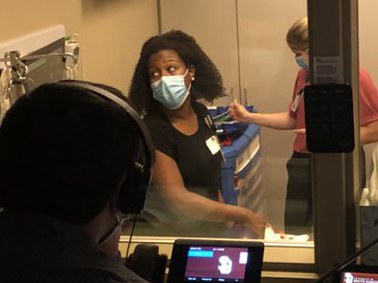For Dr. Ashley Coaston, a second-year pediatric resident at Sanford Health, being a doctor during the pandemic comes with challenges that go well beyond wearing a mask all the time.
But wearing a mask is not a bad place to begin for a pediatrician whose start in a career in medicine is intersecting with an unprecedented period in modern health care.
“When working with pediatric patients, especially babies, they’re so used to seeing our facial expressions,” Dr. Coaston said. “That brings them a lot of peace and comfort. For a while there, they were much more cautious than they were in the past. I couldn’t blame them.”
Figuring out ways to help babies feel comfortable while your face is covered by a mask is one of many adjustments caregivers must make with the realities of COVID-19.
It’s a wrinkle you wouldn’t anticipate unless you were working with babies, of course. It is nevertheless part of a pandemic learning experience that has included several lessons for residents and the people guiding their efforts.
Residents getting comfortable with the risks
“I think the COVID-19 virus brought home to a lot of our residents that doctors take care of people and put themselves at risk,” said Dr. Joseph Zenel, the director of the pediatrics residency program at Sanford Children’s Hospital and Sanford USD Medical Center in Sioux Falls, South Dakota. “It can come during medical school or as part of the resident education that they really start to realize what this calling to be a nurse or a physician really means.”
The pandemic has definitely brought that point home, perhaps more quickly than it would otherwise in some cases. For Dr. Coaston, Sanford Health’s precautionary measures have permitted her to proceed without being overwhelmed by the risks inherent to the profession.
“Sanford has been really great providing us with all the equipment that we need to protect ourselves,” Dr. Coaston said. “They’ve been very diligent, too, with letting us know that if we have any symptoms or have been exposed, there is a good protocol in place that makes me feel comfortable as a provider. If I have any concerns I can go to my program director and can let them know.”
More convinced
She grew up loving science and medicine. She also loves caring for people, so becoming a doctor seemed like an ideal career choice. More than a half-year of pandemic conditions hasn’t changed that. If anything, she’s more convinced than ever.
“She’s definitely stepped up to the plate,” Dr. Zenel said. “When the pandemic situation came up, she embraced it. Like many of the other residents, I think the pandemic has helped people become a little more confident in themselves.”
So how can a pandemic deliver confidence from a caregiver’s perspective? Dr. Zenel explains:
“As administrators we always remind our residents that providing care involves risk,” he said. “But part of medicine is being willing to deal with uncertainty. That’s one of the things that can make it stressful. It’s very similar to dealing with the pandemic. We still really don’t quite know this disease. And in pediatrics, we’re always going to be dealing with some uncertainty. You have to be able to develop a sense of confidence.”
It was that uncertainty that made Dr. Coaston’s last six months a little different than it would have been otherwise. Addressing the medical issues associated with COVID-19 are not as well-defined yet as some of those other risks that come with a life in pediatrics.
“It’s kind of a weird feeling,” Dr. Coaston said. “When you go to work, kids are sick all the time with colds and flu. You expect that kind of exposure. But when you’re exposed to a virus that we don’t know a lot about yet, it’s a different type of uncertainty and it brings a different type of anxiety.”
It can also lead to a different kind of growth for a young doctor willing to take on these unique challenges.
“It’s rewarding being able to comfort family, answer the questions that you can and reassure them,” Dr. Coaston said. “You really let them know you’re on their team and you’re going to provide the best health care that you can. That’s quite a privilege.”
Read more
- COVID-19 Q&A: Pediatrician advice on kids & coronavirus
- SD COVID Sitters: USD medical students lend a helping hand
- Health care hero: Dr. Jennifer Haggar, pediatrician
…
Posted In Children's, COVID-19, People & Culture, Physicians and APPs, Sanford Stories
